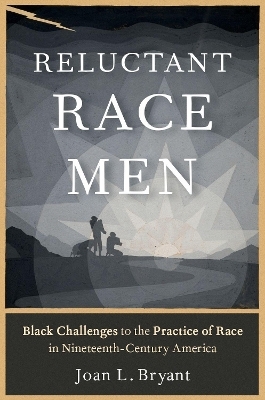
Reluctant Race Men
Black Challenges to the Practice of Race in Nineteenth-Century America
Seiten
2024
Oxford University Press Inc (Verlag)
978-0-19-531297-3 (ISBN)
Oxford University Press Inc (Verlag)
978-0-19-531297-3 (ISBN)
Reluctant Race Men traces a history of ethical, philosophical, political, religious, and scientific challenges that Black American reformers lodged against configurations of race across the long nineteenth century. It reconstructs a largely ignored reform tradition showing race as diverse practices that configure human difference, sameness, hierarchy, and consciousness.
Activists in the earliest Black antebellum reform endeavors contested and deprecated the concept of race. Attacks on the logic and ethics of dividing, grouping, and ranking humans into races became commonplace facets of activism in anti-colonization and emigration campaigns, suffrage and civil rights initiatives, moral reform projects, abolitionist struggles, independent church development, and confrontations with scientific thought on human origins. Denunciations persisted even as later generations of reformers felt compelled by theories of progress and American custom to promote race as a basis of a Black collective consciousness.
Reluctant Race Men traces a history of the disparate challenges Black American reformers lodged against race across the long nineteenth century. It factors their opposition into the nation's history of race and reconstructs a reform tradition largely ignored in accounts of Black activism. Black-controlled newspapers, societies, churches, and conventions provided the principal loci and resources for questioning race. In these contexts, people of African descent generated a lexicon for refuting race, debated its logic, and, ultimately, reinterpreted it.
Reformers' challenges call into question the notion that race is a self-evident site of identity among Black people. Their ideas instead spotlight legal, political, religious, social, and scientific practices that configured human difference, sameness, hierarchy, and consciousness. They show how a diverse set of actions constituted multi-faceted American phenomena dubbed "race."
Activists in the earliest Black antebellum reform endeavors contested and deprecated the concept of race. Attacks on the logic and ethics of dividing, grouping, and ranking humans into races became commonplace facets of activism in anti-colonization and emigration campaigns, suffrage and civil rights initiatives, moral reform projects, abolitionist struggles, independent church development, and confrontations with scientific thought on human origins. Denunciations persisted even as later generations of reformers felt compelled by theories of progress and American custom to promote race as a basis of a Black collective consciousness.
Reluctant Race Men traces a history of the disparate challenges Black American reformers lodged against race across the long nineteenth century. It factors their opposition into the nation's history of race and reconstructs a reform tradition largely ignored in accounts of Black activism. Black-controlled newspapers, societies, churches, and conventions provided the principal loci and resources for questioning race. In these contexts, people of African descent generated a lexicon for refuting race, debated its logic, and, ultimately, reinterpreted it.
Reformers' challenges call into question the notion that race is a self-evident site of identity among Black people. Their ideas instead spotlight legal, political, religious, social, and scientific practices that configured human difference, sameness, hierarchy, and consciousness. They show how a diverse set of actions constituted multi-faceted American phenomena dubbed "race."
Joan L. Bryant is Associate Professor of African American Studies at Syracuse University.
Acknowledgments
Introduction
Chapter 1: "Not a Difference of Species": Nationality and the Question of Representation
Chapter 2: "That Odious Distinction": Moral Reform and the Language of Obligations
Chapter 3: "One Common Family": Equality and the Logic of Authority
Chapter 4: "Humanology": Difference and the Science of Humanity
Chapter 5: "One Color Now": Freedom and the Ethics of Association
Chapter 6: "Race-ship": Citizenship and the Imperatives of Progress
Chapter 7: "The Whole Question of Race": Jim Crow and the Problem of Consciousness
Conclusion: "Along the Color Line"
Notes
Bibliography
Index
| Erscheinungsdatum | 16.02.2024 |
|---|---|
| Zusatzinfo | 49 halftones |
| Verlagsort | New York |
| Sprache | englisch |
| Maße | 198 x 163 mm |
| Gewicht | 612 g |
| Themenwelt | Geschichte ► Teilgebiete der Geschichte ► Religionsgeschichte |
| Sozialwissenschaften ► Ethnologie | |
| Sozialwissenschaften ► Soziologie | |
| ISBN-10 | 0-19-531297-X / 019531297X |
| ISBN-13 | 978-0-19-531297-3 / 9780195312973 |
| Zustand | Neuware |
| Informationen gemäß Produktsicherheitsverordnung (GPSR) | |
| Haben Sie eine Frage zum Produkt? |
Mehr entdecken
aus dem Bereich
aus dem Bereich
Von den Anfängen bis zur Gegenwart
Buch | Hardcover (2022)
C.H.Beck (Verlag)
34,00 €
Herkunft, Blüte, Weg nach Osten
Buch | Hardcover (2024)
C.H.Beck (Verlag)
39,00 €


